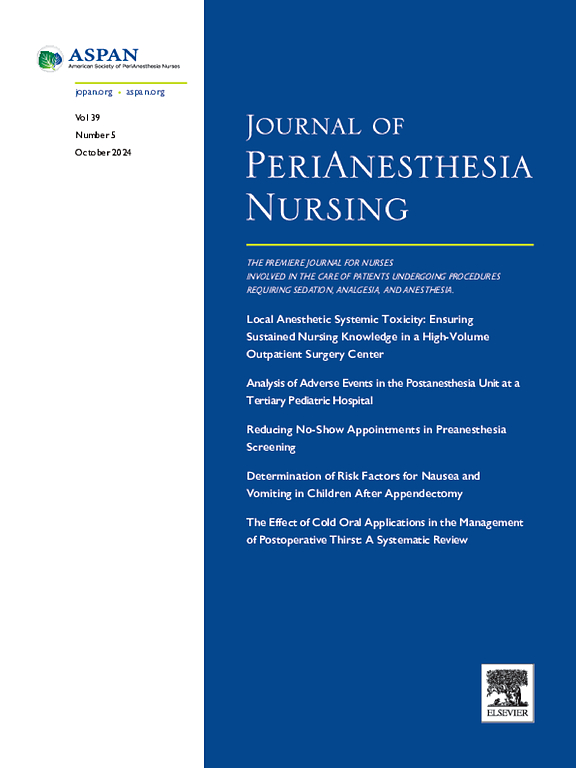虚拟现实对成年患者术前焦虑的影响:最新 Meta 分析。
IF 1.6
4区 医学
Q2 NURSING
引用次数: 0
摘要
目的:确定虚拟现实(VR)对成年患者术前焦虑症的疗效:设计:对随机对照试验进行系统回顾和荟萃分析:方法:使用PubMed、Web of Science、Cochrane Library、Embase、CINAHL、Scopus、PsycINFO、中国国家知识基础设施(CNKI)、万方数据、中文科技期刊数据库(VIP)和Sino-Med进行系统检索。所有符合条件的随机对照试验均被纳入(以中英文发表)。采用 Cochrane 协作 "偏倚风险 "工具评估纳入研究的方法学质量。使用Review Manager软件5.4进行数据分析:9项研究的样本量从72到255不等,共有1,046名参与者。荟萃分析结果表明,VR 能显著降低成人的术前焦虑(标准化平均差 = -0.48,95% CI:-0.93 至 -0.03,P = .04)。我们的结果表明,与对照组护理相比,VR 能更有效地提高术后满意度评分(平均差异 = 15.29,95% CI:6.25 至 24.33,P = .0009):研究结果表明,VR 对减轻成人术前焦虑有积极作用。研究结果表明,VR 对减轻成人术前焦虑有积极作用,还能明显提高患者术后的满意度。然而,由于样本量较小,异质性较高,研究结果还需进一步评估。本文章由计算机程序翻译,如有差异,请以英文原文为准。
Effects of Virtual Reality on Preoperative Anxiety in Adult Patients: An Updated Meta-analysis
Purpose
To determine the effectiveness of virtual reality (VR) on preoperative anxiety in adult patients.
Design
A systematic review and meta-analysis of randomized controlled trials.
Methods
A systematic search was carried out using PubMed, Web of Science, the Cochrane Library, Embase, CINAHL, Scopus, PsycINFO, China National Knowledge Infrastructure (CNKI), WANFANG DATA, Chinese Science and Technology Periodical Database (VIP), and Sino-Med from inception to December 18, 2022. All eligible randomized controlled trials published were included (published in English and Chinese). The Cochrane Collaboration “Risk of Bias” tool was used to assess the methodological quality of the included studies. Review Manager software 5.4 was used for data analysis.
Findings
Nine studies with sample sizes ranging from 72 to 255 and 1,046 participants were identified. The results of the meta-analysis showed that VR significantly reduced preoperative anxiety in adults (standardized mean difference = −0.48, 95% CI: −0.93 to −0.03, P = .04). Our results suggested that VR improved postoperative satisfaction scores more effectively compared with control care (mean difference = 15.29, 95% CI: 6.25 to 24.33, P = .0009).
Conclusions
Study results support that VR has a positive effect in reducing preoperative anxiety in adults. VR can also significantly improve patients' satisfaction after surgery. However, the results need to be further assessed due to the small sample sizes and high heterogeneity.
求助全文
通过发布文献求助,成功后即可免费获取论文全文。
去求助
来源期刊

Journal of Perianesthesia Nursing
NURSING-
CiteScore
2.20
自引率
17.60%
发文量
279
审稿时长
90 days
期刊介绍:
The Journal of PeriAnesthesia Nursing provides original, peer-reviewed research for a primary audience that includes nurses in perianesthesia settings, including ambulatory surgery, preadmission testing, postanesthesia care (Phases I and II), extended observation, and pain management. The Journal provides a forum for sharing professional knowledge and experience relating to management, ethics, legislation, research, and other aspects of perianesthesia nursing.
 求助内容:
求助内容: 应助结果提醒方式:
应助结果提醒方式:


